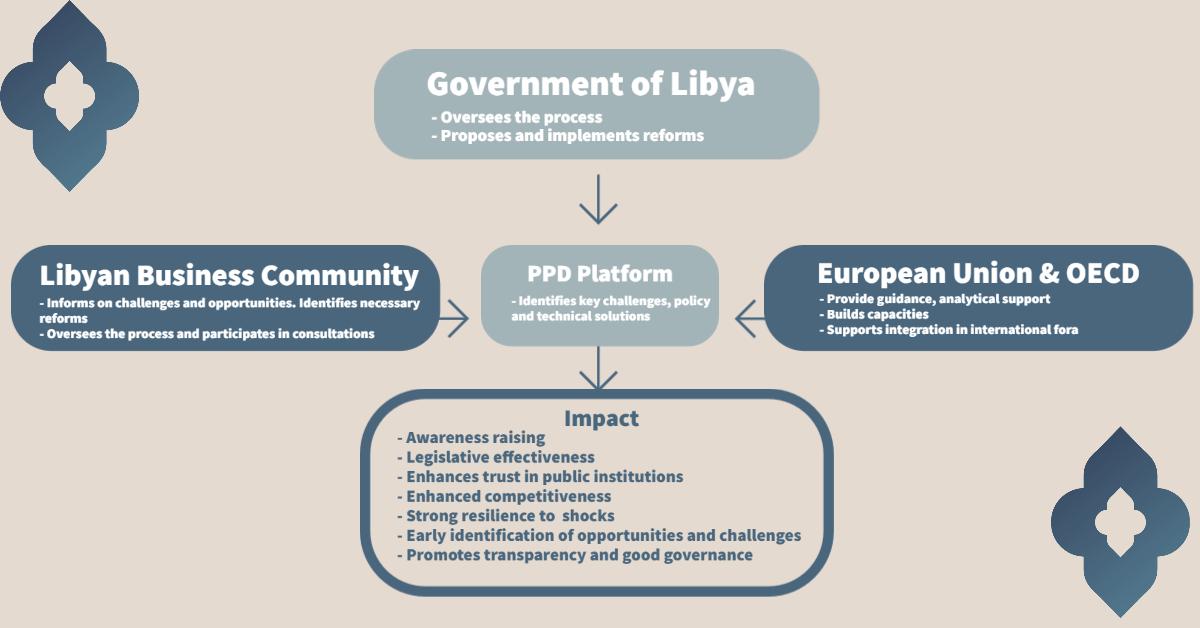EU-OECD

Project on Promoting Public-Private Dialogue in Libya

Theprogrammewill its objectivesby: worktowards
Promoting Public-Private Dialogue in Libya is an EU-OECD Programme that supports and encourages an active economic and social
dialogue between Libya’s public and private actors.
Through public private-dialogue, the Project will contribute to the adoption of the necessary economic transformation policies that can lead to post-confict recovery and the diversifcation of Libya’s economy.
->Delivering
reform tools and
Mobilising physical discussions analytical inputs for policy plans a
Public-Private dialogue describes all forms of interactions and consultations between the state and the private sector relating to the design of public policies improving the business climate, short-term macroeconomic policies, medium and long-term development strategies, sector regulation and so on.

dynamic emerging markets. Libya’s potential to capitalise on its advantages and unleash a sustainable and inclusive economic growth will depend on its ability to build a diverse economy with a competitive and robust private sector and reduce its dependence on
Libya is a resource-rich country with a young population, situated at the crossroads of well-established developed economies and hydrocarbons.
The economic transformation needed in Libya requires a new economic vision, which in turn implies mobilising a large number of actors to set the foundations for a new social contract.
60% to

Before the confict, 60% of Libyans were willing start a business
In this context, Public-Private Dialogue (PPD) represents a favourable tool to improve policy making for economic diversifcation. By leveraging the combined impact of development and business solutions, PPD allows to identify pressing concerns, implement inclusive and workable solutions and further mutual understanding and trust among economic actors. PPD is also particularly valuable in transition environments, as it contributes to consolidate peace and stability and helps rebuild the economy through private sector development.
1 in 10 to a
But only 1 in 10 had managed launch project
Public-private dialogue in Libya will be supported by a dedicated Secretariat for the PPD Platform under the supervision of Libya’s key ministries, major private sector organisations, and the close support of both the European Union and the OECD. The PPD Platform Secretariat will be in charge of coordinating and guiding the policy and technical discussions between the public and private sector actors. The PPD Platform Secretariat will conduct consultations, prepare analytical inputs that will feed the debate, and be in charge of the organisation and other logistical work related to events and communications.

Libyan policy makers and regulators, national government and, local authorities public agencies, business unions, chambers of commerce and sector-specifc business organisations, corporations, civil society organisations, universities and academics. The Platform will ensure that all Libyan economic actors are given a voice and the opportunity to contribute to the development of a new economic vision for Libya.
Libyan actors involved in the Platform will also participate in regional and international fora to exchange experiences and best practices with peers. OECD networks such as the MENA-OECD Business Advisory Board, MENA-OECD Working Group on Investment and Trade, MENA-OECD Women’s Economic Empowerment Forum and the MENA-OECD Economic Resilience Task Force will be leveraged for this objective.

